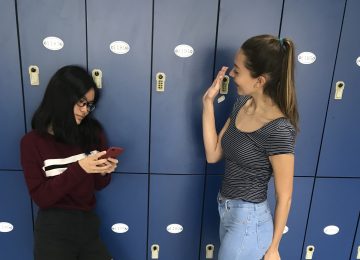
This article is a collaboration between Olivia S., Maggie M., and Michelle Z.
As we all know, AISG is an extremely academic high school where students are consistently motivated to succeed in their studies. However, sometimes this incessant drive may leave students with less time to learn basic social skills. This is a relatively common issue that many teachers and students recognise. Although of course it does not apply to the entire student body, it is a problem that arises too frequently in our high school. Politeness, as defined by dictionary.com, is behaviour that is respectful and considerate of other people. Students should not only adopt polite behaviour when interacting with their teachers, but should uphold the same respect and consideration with their fellow classmates.
When it comes to a student’s relationship with their teacher, some may feel as though they don’t need to ask for help, clarification or materials politely, but may instead demand such things, because after all, it is the teacher’s professional responsibility to teach and assist the student. High school economics teacher Ms. Partee confirmed that “as students, there are things that you expect your teacher to do and assume that teachers just do it.” The problem is that “there isn’t a level of appreciation for how much time these things take,” and most, perhaps all, teachers’ professional duties end up overflowing into their personal time. Furthermore, as high school mathematics teacher Mr. Baier shared, “I think that common courtesy could definitely be improved, such as basic politeness with hellos and thank you’s. I’ve noticed that the seniors are better at saying thank you. But every year that I’ve written [recommendation] letters, half of the students don’t say thank you.” A good recommendation letter can take a teacher hours of work, with edits, peer edits, and multiple rounds of revisions — this definitely extends beyond the regular “9-to-5” of a full-time job. Students often forget that it is professionally and personally rewarding for a teacher to hear appreciation for their work. It’s not that teachers are whining about students not recognizing them: although feelings of underappreciation may exist, the faculty also worries that students without the interpersonal skills of politeness and consideration will exit AISG without crucial social awareness they will need in their university and professional lives.
AISG promotes global mindedness, where the student body is taught to be deliberately open-minded and kind to people from different cultures. Living inside the bubble that is our international school, students often forget to acknowledge their surroundings, specifically the adults on campus. While teachers generally receive recognition and respect, students often fail to show any gratitude towards the ayis that work on our campus. With ayis working on all floors, in bathrooms, and other facilities, students barely take the time to greet them. Although some may say that there is a language barrier between them and the workers, it is nonetheless important for students to learn to show respect and appreciation to those who work outside of our classrooms. Honestly, are ni hao or xie xie ni phrases that any person living in China is not aware of?
Between students, politeness isn’t always demonstrated, and some upperclassmen claim that this problem affects them disproportionately. As a senior mentioned, “Underclassmen are especially rude—they degrade other students regarding their academic progress.” This will not come as shocking news to most twelfth graders: multiple seniors have complained about a perceived lack of respect, mostly from juniors, demonstrated towards them, as they view seniors as “less intelligent.” Comparing academics is one of the ways eleventh graders devalue the seniors: some juniors have gone to the extent of calculating SAT averages to make sure that their average is higher than that of the seniors. Twelfth graders have also heard the phrase, “none of the seniors this year will get into good universities because they’re not smart enough,” repeatedly spoken by their eleventh-grade peers ever since the college application season started. Other than the juniors, the claim has been made that certain students from other grades have become progressively ruder. Essentially, there is no longer much evidence of ninth graders looking up to seniors, or fearing their reactions when they act immature or inconsiderate. Instead, some freshmen approach upperclassmen with an aggressive attitude, including eye-rolling and arm-crossing, to name just a few examples showing the attitude seniors receive from the younger grades. According to anonymous interviews and informal observations, this situation is most prominently seen on sports teams. A tradition at AISG is that freshmen help seniors fill up water bottles and let seniors choose their jerseys first. However, recently, this tradition has been compromised after certain freshmen became reluctant to accept it.
Although AISG is both a prestigious and academic high school, it must also be one that presents high standards of politeness. Students should take more time to think about the ways in which their actions and speech might affect teachers or other students around them. They should try to place themselves in others’ shoes: how would the juniors feel if they were in the seniors’ place? How would you feel as a teacher if no one appreciated your work? Would you look forward to coming to school every morning, and would you feel encouraged to do your best work as a member of the AISG community? If we want our school to be a community, we must treat those around us with appreciation and respect, rather than nameless strangers we might pass on the street. It is time for us to take some action to reverse the discouraging trends both students and adults are noticing in our hallways.
5 thoughts on “Are Students Stressed or Just Rude?”
Sorry, comments are closed.